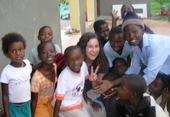"Because I'm Black?"
It was late afternoon, and I was out walking around the dam trying to get some exercise and enjoy the sunset. I often encounter villagers on this walk who either don’t know me except by rumor or have never heard of me due to the fact that the walkway I follow leads to the opposite side of the dam to another village which I have never visited or been introduced to. I always obtain the first suspicious glances which are immediately dispelled into smiles as I greet the person in question in their language. Often, after, they ask me the following questions:
Do you speak Sotho?
I speak Sotho a little.
Where do you stay?
Rasewana.
What are you doing here?
I’m a volunteer. I work in the schools.
My answers tend to immediately transform me into a friend. I have gotten used to this type of interrogation as it happens on a weekly basis.
As I was walking yesterday I met two grade twelve boys who did not know me. One of them had a camera and wanted to take a picture with me. As I posed with him he reached to grab my hand. I fended him off. His response: “Why won’t you hold my hand? Is it because I’m black?”
I’m incredulous that I still receive this type of questioning. Obviously, by being here and making a life for myself in the village, color lines must not play a significant roll in how I perceive people. This type of question often frustrates me because of the pressures it leads to. “No, it’s because I do not know you and you are not my boyfriend.”
Yet, the question still hangs thickly in the air. I am trying very hard, in my service here, not to make race an issue, but obviously, in a country where apartheid was so recently eradicated, it is a huge issue. The reason why I get upset when I receive comments like these is because I feel like it is pressure to hold his hand even if I’m not comfortable doing so. I find it asinine that the smallest action I perform is always judged on a color line. People forget that many of the things I do here: the foods I eat, the shows I watch, the music I listen to; are not a reflection on the color of my skin but instead the culture I come from; the fact that I was raised an America. So no, it’s not because you’re black, it’s because I have a comfort zone, as a human being, that was just crossed.
Do you speak Sotho?
I speak Sotho a little.
Where do you stay?
Rasewana.
What are you doing here?
I’m a volunteer. I work in the schools.
My answers tend to immediately transform me into a friend. I have gotten used to this type of interrogation as it happens on a weekly basis.
As I was walking yesterday I met two grade twelve boys who did not know me. One of them had a camera and wanted to take a picture with me. As I posed with him he reached to grab my hand. I fended him off. His response: “Why won’t you hold my hand? Is it because I’m black?”
I’m incredulous that I still receive this type of questioning. Obviously, by being here and making a life for myself in the village, color lines must not play a significant roll in how I perceive people. This type of question often frustrates me because of the pressures it leads to. “No, it’s because I do not know you and you are not my boyfriend.”
Yet, the question still hangs thickly in the air. I am trying very hard, in my service here, not to make race an issue, but obviously, in a country where apartheid was so recently eradicated, it is a huge issue. The reason why I get upset when I receive comments like these is because I feel like it is pressure to hold his hand even if I’m not comfortable doing so. I find it asinine that the smallest action I perform is always judged on a color line. People forget that many of the things I do here: the foods I eat, the shows I watch, the music I listen to; are not a reflection on the color of my skin but instead the culture I come from; the fact that I was raised an America. So no, it’s not because you’re black, it’s because I have a comfort zone, as a human being, that was just crossed.


0 Comments:
Post a Comment
<< Home